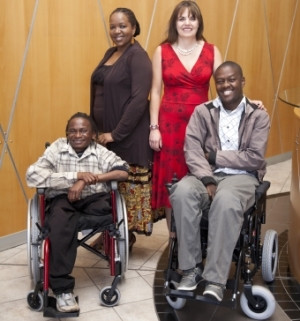
Equity and diversity in the workplace are aimed at eliminating discrimination in terms of race, gender and people with disabilities. To reach this objective involves the development of innovative programmes that will ensure the more than five million disabled South Africans obtain equal opportunities in the workplace.
This is the view of Dr Madelise Grobler, Managing Director of Bytes People Solutions (BPS), a provider of talent management services and a member of the Bytes Technology Group. She says the broad-based black economic empowerment scorecard requires that 3% of staff complement is people living with disabilities.
"Our company realised the need for the development of people living with disabilities and the valuable contribution that these people can make to the productivity levels in our country. We launched our first learnership programmes for people living with disabilities in 2006, and have since become a market leader in the training and placing of learners with disabilities. Bytes People Solutions trained more than 500 people with disabilities in the last eight years. Most of the learners that had been enrolled in our programmes are now fully employed - some for more than five years at the same company."
Dr Grobler says the number of learners with disabilities who are enrolled by companies has grown significantly over the past year, as more and more companies realise the importance of this initiative and the value that can be derived by providing opportunities for people with disabilities.
The custom-designed BPS learnership programme for people living with a disability is a comprehensive offering involving various components, such as the identification of companies where learners can gain workplace experience, the recruitment of suitable candidates, and an analysis of the specific needs-profile of each learner living with a disability.
The one-year accredited training programme in IT includes six months' training and six months' practical in-service training. The outcome of the learning experience is a national certificate.
"As an organisation dedicated to continuous learning, we strongly support the principle of 'reasonable accommodation' of people with disabilities," says Samukelisiwe Dube, Human Resources Executive of BPS.
She says reasonable accommodation must be examined on a case-by-case basis, and can range from making existing facilities accessible, restructuring jobs, acquiring or modifying existing equipment, or reassigning positions. The employee with a disability must be provided with the tools and environment to enable him/her to accomplish the job.
"Apart from assisting other companies with learners living with disabilities, we ourselves continuously identify, in consultation with our employees, where and how our own company can reasonably accommodate such individuals. Our policies and procedures are fair and equal, and includes a focus on sensitising both the workplace and the individual," Dube adds.
She says BPS is committed to providing both education and opportunities in the workplace for the disabled. More than 80% of learners who have disabilities were full-time employed by BPS after completing an accredited learnership programme with the company.
Dr Grobler adds: "As part of our corporate social investment programme, we also offer individual support to disabled learners on the programme. Assistance offered ranges from access to specialist eye care and more advanced hearing aid technology, to providing better wheelchairs."
She notes that it's one thing to provide equipment for people with disabilities, but it's equally important for an organisation to sensitise all people in the workplace to embrace diversity in whatever form it may take.
Share
Bytes People Solutions
Bytes People Solutions is a professional provider of talent management services. The services include an assessment centre, content development, business process outsourcing, online technologies, people consulting, soft skills development and ICT learning solutions. The outcome of the learning experience is an attendance certificate, international certification or a national certificate. As a member of the Bytes Technology Group, Bytes People Solutions is a leader in skills development and a trusted advisor to a large number of organisations in South Africa as well as Africa.
Editorial contacts